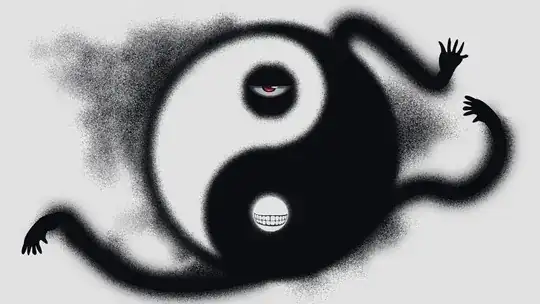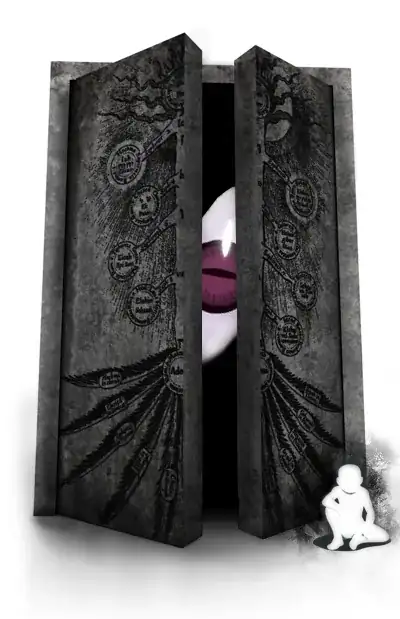I think to understand this we have to grasp the concept of the world of Fullmetal Alchemist itself. Here's my take:
If we look inside ourselves and ask who we truly are, we'll soon realize that we can't answer that question. If our answer is "all interdependent parts of my body", we're still left with the question of who "you" in "your body" is.
We might argue it's our consciousness, but the same question still applies. The answer is, it's not found only within us. We're not cut off from the outside world we move in, we're a part of it. Just like our organs are part of us. We need air around us to breathe, we eat other living organisms to sustain ourselves and eventually sustain other organisms with ours after we die.
That's what the Elric Brothers discover on the island. Everything we think we are is an effect of evolution in form of a single organism inside a much greater, bigger organism. This organism, in turn, is also part of a bigger organism and so on. Our body, our society, the food chain, our planet, our galaxy... On the highest level, there is only one, which is all.
"All is the world, one is me. One is all and all is one."
We perceive ourselves as individuals but are ultimately made of a single, great everything, sometimes called the world or the universe, or god, or one, or all, or truth.
Now, if we break down this single everything back into its first components we are left with 2 forces, orientations, flows of the world, ways of behavior, or whatever you want to call them. This was also the research of Scar's brother. There are infinite words to describe these two fundamental opposites:
- the good, the active, the living, the positive, the evolving, the creating, the growing, the forward-moving, the known, truth, order, god, humans...
- the bad, the passive, the dead, the negative, the regressing, the destroying, the killing, the backward moving, the unknown, deception, chaos, humans, god...
Good is not "good", bad is not "bad". They just are, as a part of everything and are opposites that need and birth each other.
The default state of things is that they fall apart. It's also the default state that they're being put together by the living though, that's us. There has to be both for either to occur. Because there is a set amount of energy. You cannot create something out of nothing, you have to pay an equal price.
To influence this flow of fundamental substances is what the anime calls Alchemy. There's Amestrian (inorganically oriented) and Xingese (organically oriented) Alchemy. That which allows Alchemists to perform the transmutation is the Gate of Truth. Its existence is the fantasy element about Fullmetal-Alchemist. It allows individuals to transmute matter by studying its behavior and creating a formula for it, a transmutation circle.
What's inside the gate?
My guess is that inside the gate there's the incarnation of the second opposite: death, chaos, the opposite of what the living experience, the souls of the dead. The original Fullmetal Alchemist confirms this by stating that the energy used for transmutation is taken from the tragedies of this world (likely referring to souls that left their bodies after death).
- Firstly this would explain why witnessing it gives you the ability to transmute without a transmutation circle that contains the matter's energy cycle. You have witnessed, integrated, and become a part of the cycle itself. As Edward says, he became something like a transmutation circle himself post-truth.
As a side note, Rose mentions, clapping your hands together is similar to praying to god. The concept of praying is to ask god (the world) for something, just like Alchemists "ask" the world to provide the energy for and execute transmutation. Praying and Alchemy follow the same concept, Alchemy/Science is just more empirical.
- Secondly, this would underline the great overarching story writing in
Fullmetal Alchemist.

We know that the dwarf in the flask came from the other side of the gate. That would mean he's an incarnation of chaos within order, of literal evil. He's the ultimate antagonist. All characters get the opportunity to unite and fight one ultimate evil and grow along the way without it getting forced or with the need for a new antagonist after each chapter. It's one concluded story that conveys its ideas clearly.
The moral of Fullmetal Alchemist is that we don't need the gate. There's no need to be supernaturally gifted or perform alchemy. There's no need to become perfect or play god's duties. We should experience life and learn what it's about instead of trying to go beyond it. Because that's the insurmountably scarce gift that was bestowed upon us. We're human. No more, no less.
Why is human transmutation forbidden?
In the first place, human transmutation fails. That is because there's more to a human than their physical substance. There's their soul. Their consciousness. The experiences that shaped them. Consciousness and who a person is is something shaped during life experiences. You cannot transmute a soul or a person's experiences. The world just doesn't work that way. It only moves forward.
Transmuting a human is the biggest taboo because it goes against the very logic of the world and the natural flow of everything.
In the space of truth, after attempting the transmutation of his mother, Edward says his calculations for human transmutation weren't wrong, they just didn't go far enough. What he might have realized is that you'd have to pull the extinguished soul from the other side as well.
That is what the dwarf in the flask is. It is unknown how he has been extracted apart from the use of Slave #23's blood and Alchemy. We do know though that he needed a body to walk in the world. The dots of Hohenheim's master transmuting life into death in the form of blood for an extinguished soul could connect here. If this would be the case, the life -> death transmutation direction of the cycle isn't forbidden because it follows the natural flow of things.
The lie of balance
At the conclusion of the story, the Homunculus gets punished by the truth. He asks the truth
"what's wrong with seeking perfection?!"
What he didn't understand in trying to become the perfect human by cutting off his sins is that perfection doesn't exist. Perfect balance equals nothingness. ..If you try to reach the truth on your own accord, you get irony. Trying to balance for yourself unbalances another part of you. It's just not your job. Perfection is moving forward as your imperfect self and letting the world balance you.
Van Hoenheim says during the trial with his master "if all is not included in the one then one is nothing". Everything must always exist. The meaning of life isn't to achieve balance. Neither is it to push an extreme.
It's the process of balancing and unbalancing ourselves within the one just as much as it can handle so it gets thrown back at us with the same intensity.
Life balances itself out, always. Extremes breed opposite extremes. Balance breeds nothingness. The one that balances is the inescapable truth, the felt reality.
A real-life example would be:
Relationships likely become boring without some unbalancing playfulness or complementary traits. They also fall apart if the partners are too different.
This concept of "not too much, not too little" works in all areas:
How to learn. How to work. How to do sport. How we dress. How we raise our pets. How we have a conversation. How we treat our friends. How we treat our enemies. How we treat strangers. How we treat our planet. How we live.
We're all one part of the same energy and should treat others like they're us. Because they are. The dwarf in the flask, Homunculus, wanted to split himself from the unity that is everything but simultaneously become everything too. He put himself before everyone, not realizing that he is one complement with them. For this hypocrisy, he was forced to return to his origin.
A note on religion
Orienting ourselves towards the good, towards life, is what we, as living beings, are made for and what brings us happiness and keeps unnecessary suffering away. Everyone already subconsciously believes that. It's what our parents and experiences taught us. If we didn't learn to orient ourselves towards life, we'd not be reading this. Because there are too many things in life to consider though, religion, in theory, provides a simplified frame of reference to stay oriented towards the good, towards living.
This also explains the conflict between certain teachings of religion and science.
As science is able to more precisely explain the world, the unknown or god, the need for a deity fades. Both religion and empirical science are ultimately an attempt to explain and simplify the same world to guide its believers towards the good, towards life. If religious (or even scientific leaders) become corrupted, they cling to and exist for power and control, driving unity towards the bad. This is illustrated with Father Cornello.
So, who is Truth?
With all these presuppositions in place, we can finally say who the truth is. It is the watcher, judge, and incarnation of everything. One name you might have for it is the World, or you might call it the Universe, or perhaps God, or perhaps the Truth. It is all and it is one, so of course, this also means that it is you.

